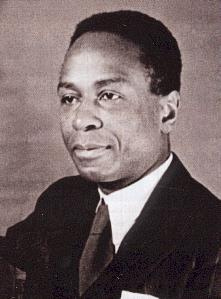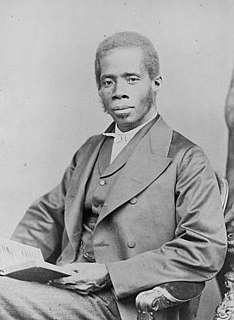Related Research Articles

William Edward Burghardt Du Bois was an American sociologist, socialist, historian, civil rights activist, Pan-Africanist, author, writer and editor. Born in Great Barrington, Massachusetts, Du Bois grew up in a relatively tolerant and integrated community, and after completing graduate work at the University of Berlin and Harvard, where he was the first African American to earn a doctorate, he became a professor of history, sociology and economics at Atlanta University. Du Bois was one of the founders of the National Association for the Advancement of Colored People (NAACP) in 1909.
Anglo is a prefix indicating a relation to, or descent from, the Angles, England, English culture, the English people or the English language, such as in the term Anglo-Saxon language. It is often used alone, somewhat loosely, to refer to people of British descent in North America, the Caribbean, South Africa, Namibia, Australia, and New Zealand. It is used in Canada to differentiate between the French speakers (Francophone) of mainly Quebec and some parts of New Brunswick, and the English speakers (Anglophone) in the rest of Canada. It is also used in the United States to distinguish the growing Spanish-speaking Latino population from the English-speaking majority. It is also used, both in English-speaking and non-English-speaking countries, to refer to Anglophone people of other European origins.
The Pan-African Congress – following on from the first Pan-African Conference of 1900 in London – was a series of eight meetings, held in 1919 in Paris, 1921 in London, 1923 in London, 1927 in New York City, 1945 in Manchester, 1974 in Dar es Salaam, 1994 in Kampala, and 2014 in Johannesburg that were intended to address the issues facing Africa as a result of European colonization of most of the continent.

Pan-Africanism is a worldwide movement that aims to encourage and strengthen bonds of solidarity between all indigenous and diaspora ethnic groups of African descent. Based on a common goal dating back to the Atlantic slave trade, the movement extends beyond continental Africans with a substantial support base among the African diaspora in the Americas and Europe.

George Padmore, born Malcolm Ivan Meredith Nurse in Trinidad and Tobago, was a leading Pan-Africanist, journalist, and author. He left Trinidad in 1924 to study medicine in the United States, where he also joined the Communist Party.

Henry Sylvester-Williams was a Trinidadian lawyer, councillor and writer, most noted for his involvement in the Pan-African Movement. As a young man he went to North America to further his education, and subsequently to Britain, where in 1897 he formed the African Association to challenge paternalism, racism and imperialism; the association aimed to "promote and protect the interests of all subjects claiming African descent, wholly or in part, in British colonies and other place, especially Africa, by circulating accurate information on all subjects affecting their rights and privileges as subjects of the British Empire, by direct appeals to the Imperial and local Governments."

Hakim Adi is a British historian and scholar who specializes in African affairs. He has written widely on Pan-Africanism and the modern political history of Africa and the African diaspora, including the 2018 book Pan-Africanism: A History. Currently a professor at the University of Chichester, Adi is an advocate of the education curriculum in the UK, both at secondary school and higher education level, being changed to reflect the history of Africa and the African diaspora, including the contribution of African people to world history.

Edward Wilmot Blyden was a Liberian educator, writer, diplomat, and politician who was primarily active in West Africa. Born in the Danish West Indies, he joined the waves of black immigrants from the Americas who migrated to the country. Blyden became a teacher for five years in the British West African colony of Sierra Leone in the early twentieth century. His writings on pan-Africanism became influential throughout West Africa, attracting attention in countries such as the United States as well. He believed that Zionism was a model for what he termed Ethiopianism, and that African Americans could return to Africa and help in the rebuilding of the continent.
E.E. K. Kurankyi-Taylor was a prominent Ghanaian judge and activist.
Amy Ashwood Garvey was a Jamaican Pan-Africanist activist. She was a director of the Black Star Line Steamship Corporation, and along with her former husband Marcus Garvey she founded the Negro World newspaper.
The West African Youth League (WAYL) was a political organisation founded by I. T. A. Wallace-Johnson in June 1935. The group was a major political force against the colonial government in West Africa, especially in the Gold Coast and Sierra Leone. The League was the first political movement in the region "to recruit women into the main membership and the decision-making bodies of the organisation".
The International African Service Bureau (IASB) was a pan-African organisation founded in London in 1937 by West Indians George Padmore, C. L. R. James, Amy Ashwood Garvey, T. Ras Makonnen and Kenyan nationalist Jomo Kenyatta and Sierra Leonean labour activist and agitator I. T. A. Wallace-Johnson. Chris Braithwaite, was Secretary of this organisation.
T. Ras Makonnen was a Guyanese-born, Pan-African financier and activist.

The First Pan-African Conference was held in London from 23 to 25 July 1900. Organized primarily by the Trinidadian barrister Henry Sylvester Williams, it took place in Westminster Town Hall and was attended by 37 delegates and about 10 other participants and observers from Africa, the West Indies, the US and the UK, including Samuel Coleridge-Taylor, John Alcindor, Dadabhai Naoroji, John Archer, Henry Francis Downing, and W. E. B. Du Bois, with Bishop Alexander Walters of the AME Zion Church taking the chair. Du Bois played a leading role, drafting a letter to European leaders appealing to them to struggle against racism, to grant colonies in Africa and the West Indies the right to self-government and demanding political and other rights for African Americans.
Dorothy Pizer or Dorothy Padmore was a British working-class anti-racist activist, secretary and publishing worker. In the 1940s and 1950s she was the partner, supporter and collaborator of Pan-African activist and Communist George Padmore.
Marika Sherwood is a Hungarian-born historian, researcher, educator and author, based in England.
The George Padmore Institute (GPI), founded in 1991 in Stroud Green Road, North London, by John La Rose (1927–2006) and a group of political and cultural activists connected to New Beacon Books, is an archive, library, educational resource and research centre that houses "materials relating to the black community of Caribbean, African and Asian descent in Britain and continental Europe". The Institute also hosts talks and readings, as well as other educational and cultural activities.
Koi Oboadabang Larbi was a Ghanaian barrister and judge. He was a justice of the Supreme Court of Ghana from 1970 to 1972.
Gershon Ashie Nikoi was a Ghanaian politician, Pan African activist and a farmer. He was a founding member of the Convention People's Party (C.P.P) and founder of the Ghana Farmers' Congress.

Cecil Belfield Clarke was a Barbadian-born physician who qualified in the United Kingdom and practised near the Elephant & Castle in London. He was a Pan-Africanist and was one of the founders of the League of Coloured Peoples in 1931.
References
- ↑ "Pan African Congress in Manchester, 1945", Working Class Movement Library.
- ↑ Hakim Adi, "George Padmore and the 1945 Manchester Pan-African Congress", in Fitzroy Baptiste and Rupert Lewis (eds), George Padmore: Pan-African Revolutionary, Kingston, Jamaica: Ian Randle, 2009, pp. 69–70.
- ↑ Adi, "George Padmore and the 1945 Manchester Pan-African Congress", in Baptiste and Lewis (2009), p. 81.
- ↑ David J. Francis, Uniting Africa: Building Regional Peace and Security Systems, Ashgate Publishing, 2006, p. 13.